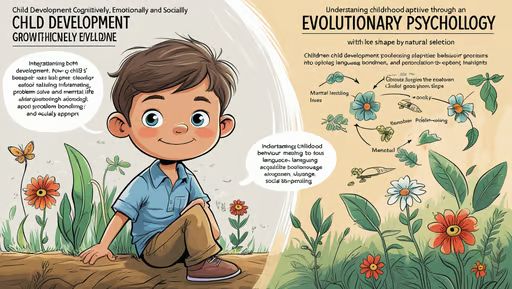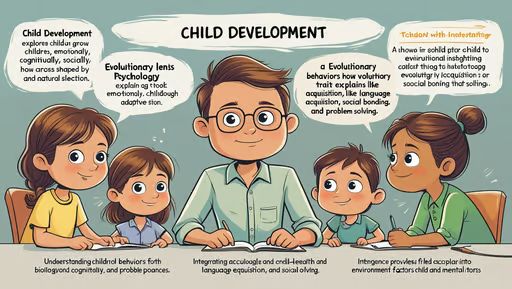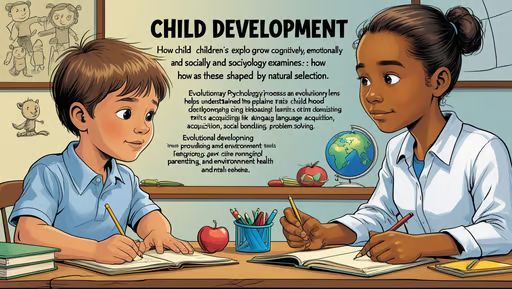Abstract
Child Development and Evolutionary Psychology, Child development is a complex process influenced by biological, psychological, and environmental factors. Evolutionary psychology provides a framework for understanding how innate behaviors and cognitive mechanisms have evolved to enhance survival and reproductive success. This article explores the intersection of child development and evolutionary psychology, emphasizing how evolutionary principles shape developmental milestones, attachment, social learning, and cognitive growth. By integrating evolutionary perspectives with contemporary developmental theories, this paper highlights the adaptive significance of childhood behaviors and their implications for modern parenting and education.
Introduction
Child development is a dynamic process that encompasses physical, cognitive, emotional, and social growth. Evolutionary psychology, which examines human behavior through the lens of natural selection, offers valuable insights into the origins of developmental patterns. From infancy to adolescence, children exhibit behaviors that reflect evolutionary adaptations designed to promote survival and reproductive fitness. This article examines key aspects of child development through an evolutionary lens, focusing on attachment theory, social learning, play, and cognitive development.
Evolutionary Foundations of Child Development
Evolutionary psychology posits that many aspects of human behavior are shaped by adaptive mechanisms that have evolved over millennia. Childhood, as a distinct life stage, is thought to have evolved to allow for extended learning and socialization, which are critical for survival in complex social environments. According to this perspective, developmental milestones such as language acquisition, theory of mind, and moral reasoning are not merely cultural constructs but deeply rooted in our evolutionary history.
For example, the prolonged period of dependency in human children, compared to other species, believed to facilitate the acquisition of complex skills and knowledge. This extended childhood allows for the development of advanced cognitive abilities, such as problem-solving and abstract thinking, which are essential for navigating social hierarchies and environmental challenges.

Attachment Theory and Evolutionary Psychology
Attachment theory, pioneered by John Bowlby, is one of the most influential frameworks in developmental psychology. Bowlby argued that the attachment bond between infants and caregivers is an evolutionary adaptation that ensures the infant’s survival. From an evolutionary perspective, attachment behaviors such as crying, clinging, and seeking proximity serve to elicit care and protection from adults.
Research in evolutionary psychology supports the idea that secure attachment promotes long-term reproductive success. Children who form strong bonds with caregivers are more likely to receive consistent care, which enhances their chances of survival and future reproductive opportunities. Conversely, insecure attachment may reflect adaptive responses to unpredictable or harsh environments, where self-reliance and emotional detachment could be advantageous.
Social Learning and Imitation
Social learning, or the ability to acquire knowledge and skills by observing others, is a cornerstone of child development. Evolutionary psychologists argue that imitation and social learning are adaptive mechanisms that allow children to acquire culturally relevant behaviors efficiently. For instance, children are predisposed to imitate high-status individuals or those who demonstrate competence, as this increases the likelihood of learning successful strategies.
The evolutionary significance of social learning is evident in the development of tool use, language, and social norms. By observing and mimicking caregivers and peers, children rapidly acquire the skills necessary for survival in their specific environment. This process is facilitated by mirror neurons, which are thought to play a key role in imitation and empathy.
The Role of Play in Development
Play is a universal aspect of childhood that has been extensively studied from an evolutionary perspective. Evolutionary psychologists argue that play serves as a mechanism for practicing skills that are essential for survival and reproduction. For example, rough-and-tumble play among boys is thought to enhance physical strength and social dominance, while pretend play fosters creativity and problem-solving abilities.
Play also provides opportunities for social bonding and cooperation, which are critical for navigating group dynamics. Through play, children learn to negotiate, share, and resolve conflicts, all of which are essential for maintaining social relationships. From an evolutionary standpoint, play is not merely a frivolous activity but a vital component of developmental adaptation.

Cognitive Development and Evolutionary Adaptations
Cognitive development, as described by Jean Piaget, involves the progressive construction of mental structures that enable children to understand and interact with their environment. Evolutionary psychology complements Piaget’s theory by emphasizing the adaptive functions of cognitive milestones. For instance, the development of object permanence, which allows infants to understand that objects continue to exist even when out of sight, is crucial for navigating the physical world.
Similarly, the emergence of theory of mind, or the ability to attribute mental states to others, is thought to have evolved to facilitate social interaction and cooperation. By understanding the intentions and emotions of others, children can predict behavior and form alliances, which are essential for survival in social groups.
Implications for Parenting and Education
Understanding child development through an evolutionary lens has practical implications for parenting and education. For example, recognizing the adaptive significance of attachment can inform strategies for fostering secure relationships between children and caregivers. Similarly, acknowledging the role of play in skill development can encourage educators to incorporate play-based learning into curricula.
Moreover, evolutionary psychology highlights the importance of tailoring educational approaches to children’s innate predispositions. For instance, children may be more motivated to learn when educational activities align with their natural interests, such as exploration and social interaction.
Conclusion
The integration of evolutionary psychology and child development offers a comprehensive framework for understanding the origins and functions of developmental processes. By examining behaviors such as attachment, social learning, play, and cognitive growth through an evolutionary lens, researchers can gain deeper insights into the adaptive significance of childhood. This interdisciplinary approach not only enriches our theoretical understanding of child development but also provides practical guidance for fostering healthy and adaptive growth in children.
References
- Bowlby, J. (1969). Attachment and Loss: Vol. 1. Attachment. New York: Basic Books.
- Bjorklund, D. F., & Pellegrini, A. D. (2002). The Origins of Human Nature: Evolutionary Developmental Psychology. Washington, DC: American Psychological Association.
- Piaget, J. (1952). The Origins of Intelligence in Children. New York: International Universities Press.
- Tomasello, M. (1999). The Cultural Origins of Human Cognition. Cambridge, MA: Harvard University Press.
- Geary, D. C. (2005). The Origin of Mind: Evolution of Brain, Cognition, and General Intelligence. Washington, DC: American Psychological Association.

11 thoughts on “Child Development and Evolutionary Psychology”
Comments are closed.